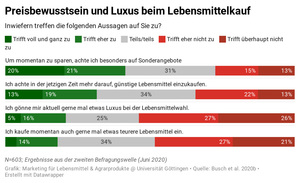 Göttingen research team examines the behavior and attitudes of consumers in Germany in the different phases of the corona pandemic
Göttingen research team examines the behavior and attitudes of consumers in Germany in the different phases of the corona pandemic
Since mid-April, researchers at the University of Göttingen have been conducting a Germany-wide consumer survey to determine how the corona pandemic affects shopping, eating and cooking behavior. In mid-June, at a time with low numbers of infections and increasing relaxation, the same consumers were surveyed again. A comparison of the data shows a decline in behavior patterns in some areas as they did before the corona pandemic. People cooked less at home, but went shopping more often. Other aspects remained stable, such as the increased importance of sustainability aspects in the choice of food and the increased preference for domestic agriculture. The results were published in a discussion paper at the Department of Agricultural Economics and Rural Development at the University of Göttingen.
The study is designed as a panel study, so that only those people were invited to the June survey who had already participated in the first survey in April 2020. In total, the answers from 603 respondents were included in the evaluation. The sample largely corresponds to the German population in terms of age, gender, income, education and geographical distribution. A third survey will follow in the further course of the corona pandemic. The second survey also included questions about gastronomy, household stockpiling and working conditions in the meat industry.
A new result is an increased price awareness of the respondents. 28 percent of those surveyed said they were spending more money on food during the corona pandemic. Over 40 percent said that they are paying more attention to special offers and 30 percent that they are buying more cheap groceries. "One possible explanation is the shift from out-of-home consumption to the household sector, which is why many people are more aware of the fact that they are spending more money buying groceries," commented first author Dr. Gesa Busch these numbers. “It was also surprising that despite the experience of empty supermarket shelves at the beginning of the pandemic, only around 44 percent of those surveyed have household supplies for at least ten days at home.” Most people still have very high levels of trust in food security.
A look at the gastronomy shows that the respondents are hesitant to resume eating out. In mid-June, only a third had visited a restaurant again. However, half of the respondents see a need to support the gastronomy with a visit. "Overall, a difficult future is looming, especially for classic gastronomy," said Prof. Dr. Achim Spiller, Head of the Marketing Department for Food and Agricultural Products at the University of Göttingen.
"For the meat industry, however, our study shows even stronger signs of crisis," said Spiller. The corona outbreaks in meat processing companies have drawn the attention of society and politics to the working conditions of the employees there. When asked about different aspects of the working conditions in slaughterhouses, the respondents rate these as negative throughout. There is no difference between the points directly related to the corona outbreaks, such as the risk of infection, and general aspects, such as the high workload. The corona outbreaks have once again broadly attacked the already bad image of the industry.
www.uni-goettingen.de
























































































